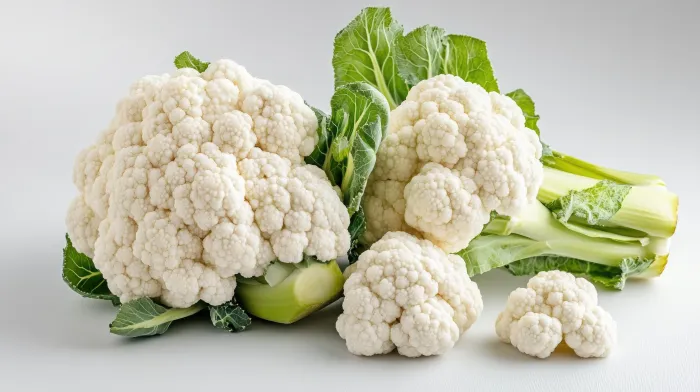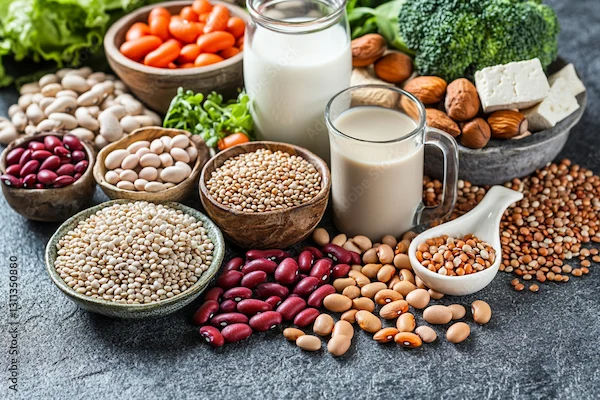Benefits Of Cauliflower
Discover the health benefits of cauliflower, rich in vitamins and antioxidants, supporting digestion, boosting immunity, promoting heart health, and aiding weight management for overall wellness and vitality.


Introduction
Cauliflower, commonly known as gobhi in Hindi, is a versatile and nutritious vegetable that belongs to the cruciferous family, along with broccoli, cabbage, and Brussels sprouts. This humble vegetable is packed with essential vitamins, minerals, and antioxidants, making it a great addition to a healthy diet. Whether you enjoy it steamed, roasted, mashed, or even as a low-carb rice substitute, cauliflower offers numerous health benefits that can support your overall well-being.
Nutritional Powerhouse
Cauliflower is low in calories but rich in nutrients, making it an excellent choice for weight management and overall health. Here’s what a single cup (100 grams) of raw cauliflower contains:
Calories: 25
Fibre: 2 grams
Vitamin C: 77% of the Daily Value (DV)
Vitamin K: 20% of the DV
Folate (Vitamin B9): 14% of the DV
Potassium: 9% of the DV
Magnesium, Phosphorus, and Manganese: Small but significant amounts
Additionally, cauliflower contains powerful antioxidants like sulforaphane and indole-3-carbinol, which help fight inflammation and reduce the risk of chronic diseases.
Top Health Benefits of Cauliflower
Let us see some of the benefits of cauliflower, which offer numerous health benefits, from boosting immunity to supporting digestion and heart health:
1. Supports Heart Health
Cauliflower contains fibre, antioxidants, and potassium, which contribute to heart health. The fibre helps lower bad cholesterol (LDL), while potassium regulates blood pressure. The antioxidants reduce inflammation in blood vessels, lowering the risk of heart disease.
2. Aids Digestion and Gut Health
With 2 grams of fibre per cup, cauliflower promotes healthy digestion by preventing constipation and supporting gut bacteria. The glucosinolates in cauliflower also help protect the stomach lining, reducing the risk of ulcers.
Consult Top Nutritionists To Add Cauliflower To Your Diet
3. Boosts Immunity
Thanks to its high vitamin C content, cauliflower strengthens the immune system. Vitamin C stimulates white blood cell production, helping the body fight infections and illnesses.
4. May Help Prevent Cancer
Cauliflower contains sulforaphane, a compound that has been studied for its potential to slow cancer cell growth, particularly in breast, prostate, and colon cancers. The indole-3-carbinol in cauliflower also helps detoxify harmful substances in the body.
5. Supports Weight Loss
Low in calories and high in fibre, cauliflower keeps you full for longer, reducing unnecessary snacking. It’s a great substitute for high-carb foods like rice and mashed potatoes, making it ideal for weight management.
6. Good for Brain Health
The choline in cauliflower supports brain function by improving memory and cognitive performance. It also helps in nerve signalling and reducing inflammation in the brain.
7. Strengthens Bones
Cauliflower provides vitamin K, which improves calcium absorption and bone strength, reducing the risk of osteoporosis.
8. Helps Control Blood Sugar
With a low glycemic index and high fibre content, cauliflower helps regulate blood sugar levels, making it a great choice for people with diabetes.
How to Include Cauliflower in Your Diet?
Cauliflower is incredibly versatile and can be enjoyed in many ways:
Steamed or Roasted: A simple and healthy side dish.
Cauliflower Rice: A low-carb alternative to white rice.
Mashed Cauliflower: A lighter version of mashed potatoes.
Cauliflower Soup: A creamy, nutritious meal.
Raw in Salads: Adds crunch and nutrients.
Potential Side Effects
While cauliflower is highly beneficial, some people may experience:
Bloating or Gas: Due to its high fibre and FODMAP content.
Thyroid Issues (in excess): Cruciferous vegetables may interfere with iodine absorption if consumed in very large amounts.
If you have thyroid concerns, consult your doctor before making cauliflower a major part of your diet.
Conclusion
Cauliflower is a nutrient-dense, low-calorie vegetable that offers numerous health benefits, from boosting immunity to supporting heart and brain health. Including it in your meals can be a simple yet powerful way to enhance your overall well-being.
If you have specific health concerns or dietary restrictions, it’s always a good idea to consult a nutritionist or doctor for personalised advice. You can easily book a consultation with a healthcare expert through Apollo 24|7 to get guidance on the best diet for your needs.
Consult Top Nutritionists
Consult Top Nutritionists To Add Cauliflower To Your Diet
Dr Sumanth R
General Physician
2 Years • MBBS
Bengaluru
PRESTIGE SHANTHINIKETAN - SOCIETY CLINIC, Bengaluru

Dr. Ramalinga Reddy
General Physician
5 Years • MBBS MD General medicine
Bengaluru
PRESTIGE SHANTHINIKETAN - SOCIETY CLINIC, Bengaluru
Ms. Bhavana Shetty
Dietician
7 Years • DDHN & Masters in Clinical Nutrition & Dietetics
Bangalore
Apollo Sugar Clinic, Seetha circle bangalore, Bangalore
Dt. Ila Sharma
Clinical Nutritionist
18 Years • Master in food & Nutrition
Gurugram
VIPUL GREENS - SOCIETY CLINIC, Gurugram
Mrs Sneha P V
Nutritionist
10 Years • Master of science in Food and Nutrition
Bangalore
Apollo Clinic Bellandur, Bangalore
Consult Top Nutritionists
Dr Sumanth R
General Physician
2 Years • MBBS
Bengaluru
PRESTIGE SHANTHINIKETAN - SOCIETY CLINIC, Bengaluru

Dr. Ramalinga Reddy
General Physician
5 Years • MBBS MD General medicine
Bengaluru
PRESTIGE SHANTHINIKETAN - SOCIETY CLINIC, Bengaluru
Ms. Bhavana Shetty
Dietician
7 Years • DDHN & Masters in Clinical Nutrition & Dietetics
Bangalore
Apollo Sugar Clinic, Seetha circle bangalore, Bangalore
Dt. Ila Sharma
Clinical Nutritionist
18 Years • Master in food & Nutrition
Gurugram
VIPUL GREENS - SOCIETY CLINIC, Gurugram
Mrs Sneha P V
Nutritionist
10 Years • Master of science in Food and Nutrition
Bangalore
Apollo Clinic Bellandur, Bangalore




